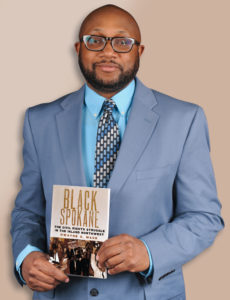The Carter G. Woodson Chair in African American History and an Associate Professor of History, Dwayne Mack came to Berea in 2003 after completing his Ph.D. at Washington State University at Pullman.

His second book, “Black Spokane: The Civil Rights Struggle in the Inland Northwest,” developed from a conversation with his graduate advisor, Leroy Ashby, who suggested Spokane, Washington as a topic worth exploring. Not only did the city have a fascinating history, it also had the advantage of being close to the university, Mack recalls. “Since I was a family man and I couldn’t travel far to do research on a topic . . . we both settled on Spokane.” Mack’s dedication to research and family life is still evident today in his work with students and his “special interest,” raising his children, Charity, Liberty, Jelani, and Kosey with his wife Felicia.
Doug Widner recently had a chance to sit down with Dr. Mack to discuss his most recent book. An edited excerpt from that interview follows and additional video excerpts can be seen below.
How does your book contribute to national conversations about race and history?
You look at recent events in places like Ferguson, Missouri, I think we need to understand how these cities evolve over time. Why blacks migrated to places like Ferguson and the living conditions in places like Ferguson—the job opportunities or lack thereof. What’s the economic situation for African Americans? The educational system? The healthcare system? I think all cities throughout this country need to be examined, big and small. But especially cities out west. I think our attention needs to go there. African-Americans in the west and their interactions not only with whites, but other groups as well, like Latinos, Asians.
The unique thing about Spokane is that it’s a black-white dynamic; it is like Berea. You really don’t have other groups. The second largest group would be African American. So Spokane is different from Los Angeles where you have a large Latino population, and you can merge, collaborate with Latinos in the freedom struggle.
But in Spokane, blacks had liberal whites to collaborate with, and work with, and form coalitions with, whites who were sympathetic to their cause. And that’s the difference between Spokane and some of the other places. It’s a black and white struggle; it’s about interracial reconciliation. It’s about the two groups coming together to fight a common enemy.
What’s your next big project?
I am developing an urban history textbook. Because Spokane is in an urban setting, I want to continue my focus on other urban spaces. Especially with the recent uprisings in places like Staten Island and Ferguson, Missouri, I think we need to examine these urban landscapes and understand why these uprisings occur.

